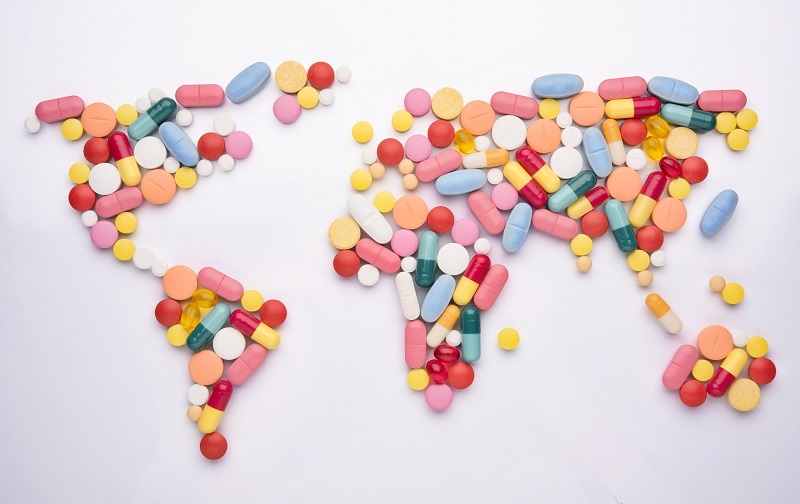Like all global health epidemics, when Ebola arrived, it came as a surprise. The potential impact of Ebola wasn’t clear when it emerged in 2013, but a year later it became apparent that concerted action needed to be taken to develop a cure and halt its spread.
In August 2014, the World Health Organization (WHO) convened an advisory panel which unanimously agreed that unregistered interventions that had shown promising results in preclinical laboratory and animal phases, but had yet to be fully evaluated in phase I or II trials in humans, should still be assessed to help find a cure.1
This decision gave clinical researchers the green light to reinvigorate previously discarded research, while attempting to find an effective cure for this deadly disease. The years of preparation and groundwork for an effective clinical trial were rapidly condensed as the scale of the Ebola crisis became apparent.
Research conducted during the Ebola crisis provides a useful model for exploring the difficulties of leading research during an emergency, with more recent epidemic crises like the ZIKA virus, SARS, and the chikungunya virus following a similar approach, and facing similar challenges.
Organising, managing and successfully delivering clinical trials is a complex and multifaceted challenge that raises logistical, ethical and bureaucratic questions. Here’s what we can learn from managing clinical research during a global health emergency like Ebola.
Locations & Logistics
Clinical trials are usually the result of years of careful planning, investment and preparation. But when an epidemic occurs, the standard systems, support and infrastructure necessary to conduct research may not be present.
A disaster is defined by the United Nations Office for Disaster Risk Reduction as a “serious disruption of the functioning of a community or a society.” When investigating research conditions in Ebola-struck nations, the WHO concluded “health infrastructures were poor, and there was a major shortage of health care personnel”.2
For example, the storage environment and transportation conditions of the Ebola vaccine needed to be precisely -80°C, which posed a challenge for researchers - particularly in crisis-struck African nations which had poor infrastructure. Unable to rely on local infrastructure, researchers needed to create appropriate environments for managing their clinical trials.
For future researchers facing similar challenges, specialist organisations, like MESM, can transport, and calibrate the equipment needed, as well as develop a supply chain solution for the duration of the trial. This may come as a welcome resource both inside and outside the laboratory walls of an epidemic.
Prior research and investigation into the environment, and the available infrastructure is essential. These environmental factors should be considered as part of study design considerations with the understanding that logistical difficulties, like vaccine distribution, can directly affect recruitment strategy and research outcomes.
Researchers need to be aware of the complications in developing a safe physical research environment, but should also consider the data security, management and processing risks inherent in all trials, in the context of the country where the trial is taking place. For example, one research study found that relying on electronic devices like PCs, iPads and mobile phones for data collection was unfeasible and negatively impacted the research.3
Before embarking, researchers and study managers should consider organising a comprehensive trial ‘walk through’ where all potential risks are identified and, as far as possible, managed.
Ethical Considerations
Standard clinical trial ethics are complex, but the situation becomes even more complex in a crisis zone.
Such concerns have ethical implications for trial design.4 In these exceptional circumstances, randomised controlled trials (RCTs) may be ethically questionable, with some researchers arguing that adaptive trials may provide a more ethical choice, a view supported by the WHO.5 In a recent Lancet paper, the authors argue that randomised controlled trials could be both ‘unethical and infeasible’. Adaptive trials, they argue, are more compassionate in a crisis, with all participants receiving the intervention.6 Adaptive trials aren’t without their challenges, and ultimately the decision on structure remains with the study manager.
Ethical considerations have clear implications for patient recruitment and involvement. Resurrecting and expediting the trials of previously discarded drugs exposes participants to risk, demanding robust informed consent. But imposing traditional informed consent models in a crisis may be difficult. A recent paper recommends consent documents be internally consistent and in a language that can easily be understood by the reader, with another calling for all epidemic research to be ‘patient-centred’ from the outset, with local agencies involved in recruitment.7
During the latter stages of the Ebola crisis, there was an unedifying situation where researchers were competing for the interests of patients, with multiple clinical trials chasing too small a patient cohort.8 Your trial design should have a clear strategy in place, informed by local experts, to recruit, inform and retain participants.
For those seeking practical advice, the WHO’s training manual provides a comprehensive guide to on-site ethics, covering many of the typical issues researchers and observers will experience.9
The field of disaster research ethics is highly complex for the researcher. A comprehensive and challenging paper in the BMJ poses an abundance of questions researchers should consider before starting clinical trials in global emergencies, but stresses that researchers should ensure that safeguards are reinforced, data shared openly, and have strong ethical oversight.10
Collaboration & Communication
Introducing a clinical trial in a crisis necessitates collaboration with large numbers of individuals and organisations. One study of a clinical trial in Liberia during the Ebola crisis claimed researchers needed to manage relationships with “the WHO, national governments and regulators, the U.S. Embassy, clinical trialists, pharmaceutical representatives, community leaders, healthcare institutions, and contractors.”11
Each stakeholder had a specific role to play, but also their own procedures and processes, and organisational culture. Bringing these all together in a short period of time is a clear challenge that demands strong leadership and robust trial design.
This example also highlights a more fundamental question about whether research interventions during a crisis will be supported and valued. The ‘conventional wisdom’ in this instance was that trials would be supported; the reality was that the local population and healthcare system were cynical and unsupportive – at least in the beginning.11
Building a strong communication network, as well as a collaborative workflow with all local stakeholders, from the beginning of the emergency medical research, is an important trail structure for researchers to action to overcome this challenge.
The Ebola outbreak claimed the lives of 11,310 people, and had the potential to be much worse.12 The WHO hoped that by rapidly introducing research they would find a cure, and their approach proved successful. Within 20 months of the Ebola outbreak, a team of researchers reported that they had developed an effective vaccine.13
While not providing total defence from the disease, the development of a vaccine validates the approach of the WHO, and is likely to provide a blueprint for clinical research in future epidemic emergencies.
In a global health emergency, the need to find an effective cure can accelerate the pace of clinical research, but the solid foundations of good clinical research and patient engagement, as well as solid support from partners remain the same.13
References:
1. Sayburn Anna. WHO gives go ahead for experimental treatments to be used in Ebola outbreak BMJ 2014; 349 :g5161 Available from: http://www.bmj.com/content/349/bmj.g5161
2. Integrating Clinical Research into Epidemic Response: The Ebola Experience. National Academies of Sciences, Engineering, and Medicine; Health and Medicine Division; Board on Health Sciences Policy; Board on Global Health; Committee on Clinical Trials During the 2014-2015 Ebola Outbreak; Busta ER, Mancher M, Cuff PA, et al., editors. Washington (DC): National Academies Press (US); 2017 Jun 26. Available at: https://www.ncbi.nlm.nih.gov/books/NBK441685/
3. Larson GS, Baseler BR, Hoover ML, et al. Conventional Wisdom versus Actual Outcomes: Challenges in the Conduct of an Ebola Vaccine Trial in Liberia during the International Public Health Emergency. The American Journal of Tropical Medicine and Hygiene. 2017;97(1):10-15. doi:10.4269/ajtmh.16-1015.
4. Lanini, S. et al. Are adaptive randomised trials or non-randomised studies the best way to address the Ebola outbreak in west Africa? Lancet Infect Dis. 2015 Jun;15(6):738-45. doi: 10.1016/S1473-3099(15)70106-4. Epub 2015 Apr 14. https://www.ncbi.nlm.nih.gov/pubmed/25881871
5. Lanini, S. et al. Are adaptive randomised trials or non-randomised studies the best way to address the Ebola outbreak in west Africa? Lancet Infect Dis. 2015 Jun;15(6):738-45. doi: 10.1016/S1473-3099(15)70106-4. Epub 2015 Apr 14. https://www.ncbi.nlm.nih.gov/pubmed/25881871
6. Rojek, A M. Horby, P W. Modernising epidemic science: enabling patient-centred research during epidemics. BMC Medicine201614:212 https://doi.org/10.1186/s12916-016-0760-x Available from: https://bmcmedicine.biomedcentral.com/articles/10.1186/s12916-016-0760-x
7. Rojek AM, Horby PW. Offering patients more: how the West Africa Ebola outbreak can shape innovation in therapeutic research for emerging and epidemic infections. Philosophical Transactions of the Royal Society B: Biological Sciences. 2017;372(1721):20160294. doi:10.1098/rstb.2016.0294. Available from: https://www.ncbi.nlm.nih.gov/pmc/articles/PMC5394634/
8. Ethics in epidemics, emergencies and disasters: Research , surveillance and patient care. World Health Organisation. 2015. Available from: http://apps.who.int/iris/bitstream/10665/196326/1/9789241549349_eng.pdf ((Accessed 20 September 2017)
9. Calain P, The Ebola clinical trials: a precedent for research ethics in disasters Journal of Medical Ethics Published Online First: 29 August 2016. doi: 10.1136/medethics-2016-103474 Available from: http://jme.bmj.com/content/medethics/early/2016/08/29/medethics-2016-103474.full.pdf
10. Larson GS, Baseler BR, Hoover ML, et al. Conventional Wisdom versus Actual Outcomes: Challenges in the Conduct of an Ebola Vaccine Trial in Liberia during the International Public Health Emergency. The American Journal of Tropical Medicine and Hygiene. 2017;97(1):10-15. doi:10.4269/ajtmh.16-1015. Available from: https://www.ncbi.nlmc.nih.gov/pmc/articles/PMC5508914/
11. How to improve speed, effectiveness of clinical trials during an epidemic. Science Daily. (Internet) 2017. Available at:
https://www.sciencedaily.com/releases/2017/04/170412115747.htm (Accessed 20 September 2017)
12.Henao-Restrepo, Ana Maria et al.Efficacy and effectiveness of an rVSV-vectored vaccine expressing Ebola surface glycoprotein: interim results from the Guinea ring vaccination cluster-randomised trial The Lancet , Volume 386 , Issue 9996 , 857 – 866. Available from: http://www.thelancet.com/journals/lancet/article/PIIS0140-6736%2815%2961117-5/abstract
13.Final trial results confirm Ebola vaccine provides high protection against disease. World Health Organisation. 2016. (online) Available at: http://www.who.int/mediacentre/news/releases/2016/ebola-vaccine-results/en/ (Cited 20 September 2017)


